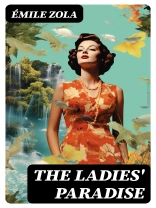In ‘The Ladies’ Paradise, ‘ Émile Zola presents a vivid exploration of the rise of the modern department store in 19th-century Paris, employing a compelling naturalistic style characterized by meticulous detail and socio-economic critique. The novel intricately weaves the lives of its characters—chief among them the ambitious and naive Denise Baudu—against the backdrop of a rapidly changing retail landscape, highlighting themes of consumerism, class struggle, and female empowerment. Zola’s adept use of dialogue and descriptive imagery enhances the reader’s immersion into the bustling world of commerce, capturing both the allure and the underlying exploitation of this burgeoning modernity. Émile Zola, a leading figure of the Naturalism literary movement, drew upon his observations of societal evolution and personal experience in the industrial milieu to craft this narrative. His own upbringing in a family facing economic challenges and his deep engagement with the social issues of his time inspired Zola to delve into the complexities of human behavior within the framework of capitalism, making ‘The Ladies’ Paradise’ a poignant reflection on the era. For readers seeking a rich commentary on the intersection of gender, class, and consumer culture, Zola’s ‘The Ladies’ Paradise’ is an essential read. It not only serves as a historical account of a transformative period in retail but also as a thought-provoking examination of the personal and societal ramifications of modern capitalism.
About the author
Émile Zola (1840–1902) was a prominent French novelist, a leading figure of literary naturalism, and a pivotal contributor to the development of theatrical naturalism. Born in Paris, France, Zola was largely self-educated after his family faced financial hardships. His vigorous involvement in the literary circle and a strong penchant for societal issues led to works that reflected his deep concerns on social reform and human behavior under the pressures of modernity. Zola’s literary career culminated with the monumental 20-volume series Les Rougon-Macquart (‘The Rougon-Macquart Cycle’), delineating a comprehensive narrative of conditions across Second Empire France. Among these, ‘The Ladies’ Paradise’ (‘Au Bonheur des Dames’, 1883) stands out as a penetrating critique of capitalism and consumer culture set against a department store’s backdrop. This novel, alongside others like ‘Germinal’ and ‘Nana’, exemplifies Zola’s characteristic style: a blend of meticulous research, narrative power, symphonic structuring of plot, and a conviction that literature should confront the prevailing social injustices. Zola’s influence extends beyond literature into the political sphere. His famous open letter ‘J’accuse…!’ addressed to the President of France, courageously defended the wrongfully accused Alfred Dreyfus, thereby solidifying Zola’s legacy both as a literary giant and a symbol of uncompromising moral fervor.












